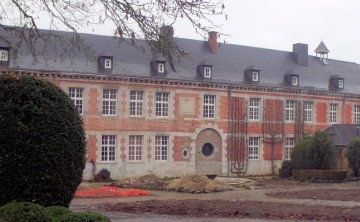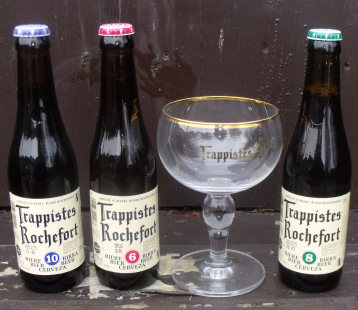 |
 |
|

|
|

|
 |
home
about
Protz
features
A-Z
books
|
|
Protz:
features
reviews
tastings
news & events
books
|

| |
Rochefort
Text and photographs by Willard Clarke, 02/11
A tremor ran through the beer world in December when the news spread of a major fire at the Abbey of Rochefort in Belgium. The monastery - its full name is the Abbaye Notre-Dame de St Rémy - is
one of the famous six in Belgium that brew beer in the Trappist tradition. Lovers of these amazing brews were horrified that production might be halted as a result of the fire.
 I had arranged before the fire to visit Rochefort and now the visit took on an added urgency. From Brussels I caught a train that ended in Luxembourg and went through the regional capital of Namur.
At Jemelle station I was met by Brother Pierre, who works in the brewery and he drove the short distance to the charming tourist town of Rochefort - famous for its chocolate makers and bakeries -
and then along a narrow winding and pot-holed road to the abbey. Right: Brother Pierre in the brewhouse (click photo for larger image).
It's often said that Rochefort is in the Ardennes but is in fact in a smaller, neighbouring region known as Famenne. Both regions enjoy superb countryside dominated by thickly-wooded hills.
I had arranged before the fire to visit Rochefort and now the visit took on an added urgency. From Brussels I caught a train that ended in Luxembourg and went through the regional capital of Namur.
At Jemelle station I was met by Brother Pierre, who works in the brewery and he drove the short distance to the charming tourist town of Rochefort - famous for its chocolate makers and bakeries -
and then along a narrow winding and pot-holed road to the abbey. Right: Brother Pierre in the brewhouse (click photo for larger image).
It's often said that Rochefort is in the Ardennes but is in fact in a smaller, neighbouring region known as Famenne. Both regions enjoy superb countryside dominated by thickly-wooded hills.
 Among the ancient stone buildings at the abbey, with paths made from local marble, there was much activity from workers with diggers and other modern mechanical devices. They were repairing parts of
the community - some draped in tarpaulin - that were damaged by the fire. Brother Pierre produced a diary and pointed to the dread date of 29 December when the fire broke out. Thankfully,
the damage was not too serious.
The brewery was slightly affected but production didn't stop. The awesome library, with a collection of 20,000 volumes, escaped harm, as did the church itself.
Rochefort has had more than its share of problems over the centuries. It was founded in 1230 as a convent but the nuns found the remote rural life too harsh and they were replaced by monks in 1464.
A brewery was added in 1595. The monks were forced to abandon the abbey at the time of the French revolution, when scant attention was paid to the nominal border between France and the Low
Countries. The brothers returned to rebuild the church in 1887 and a new brewery was added two years later.
The current brewery dates from the 1960s but is firmly traditional. Pale, wintery sunlight came in through stained glass windows and picked out three gleaming copper tuns: mash mixer, filtration
vessel and boiling copper. The monks used to grow their own barley and hops but the abbey farm was closed in the 1960s and now malt is sourced from France while hops - in
pellet form - come from the German Hallertau and Slovenia.
Among the ancient stone buildings at the abbey, with paths made from local marble, there was much activity from workers with diggers and other modern mechanical devices. They were repairing parts of
the community - some draped in tarpaulin - that were damaged by the fire. Brother Pierre produced a diary and pointed to the dread date of 29 December when the fire broke out. Thankfully,
the damage was not too serious.
The brewery was slightly affected but production didn't stop. The awesome library, with a collection of 20,000 volumes, escaped harm, as did the church itself.
Rochefort has had more than its share of problems over the centuries. It was founded in 1230 as a convent but the nuns found the remote rural life too harsh and they were replaced by monks in 1464.
A brewery was added in 1595. The monks were forced to abandon the abbey at the time of the French revolution, when scant attention was paid to the nominal border between France and the Low
Countries. The brothers returned to rebuild the church in 1887 and a new brewery was added two years later.
The current brewery dates from the 1960s but is firmly traditional. Pale, wintery sunlight came in through stained glass windows and picked out three gleaming copper tuns: mash mixer, filtration
vessel and boiling copper. The monks used to grow their own barley and hops but the abbey farm was closed in the 1960s and now malt is sourced from France while hops - in
pellet form - come from the German Hallertau and Slovenia.
 I was keen to unravel the mystery of why Rochefort, alone among the Belgian Trappist breweries, makes only dark beers. There are three, labelled 6, 8 and 10, using an old method of measuring strength,
which today are rendered as 7.5%, 9.2% and 11.3% alcohol by volume respectively. They are brewed with pale Pilsner malt, a generous addition of darker Munich malt, and liquid brewing sugar.
The reason for the Rochefort style lies in the brewing water. It comes from a grotto beneath a hill known as La Tridaine: there are a number of grottoes in the Rochefort area and are popular with
pot-holers. The water is rich in calcium carbonate, which is best suited to the production of dark beer. Fascinatingly, the nearby Abbey of Orval in the Ardennes produces just pale beer. Its water
is harder with calcium sulphate. Brother Pierre was interested to hear of the revival of porter and stout in London, for he feels the Rochefort beers have much in common with the dark brews of the
English capital, made with "liquor" equally rich with calcium carbonate, before brewers learned to "Burtonise" their water.
There are 15 monks working at the abbey. Brother Pierre, who is 62 and has been in holy orders since his late teens, works mainly in the brewery laboratory. The European authorities make such heavy
demands on quality control that the monks are building a bigger lab and already employ lay technicians to monitor the beer.
The monks brew just two days a week and produce in total 26,000 hectos a year. Their output is tiny compared to the abbeys at Chimay (200,000 hectos a year) and Westmalle (120,000). In common with
the Westvleteren abbey, sales of the beer are restricted and the monks only allow themselves one or two bottles a week. More is consumed during Lent, when beer takes on its historic role as
"liquid bread".
Rochefort's beers are available only in bottled form. At the end of fermentation in small conical vessels, the beer is centrifuged and re-seeded with fresh yeast and a dosage of white liquid sugar.
The beers are kept at 20 degrees Celsius in a store room for two weeks where a second fermentation takes place in bottle.
Brother Pierre says the beers can be drunk young but improve with age up to five years. I came home with a bottle of each beer and will attempt to lay them down for the prescribed period. But I
fear I may be tempted from the path of righteousness.
I was keen to unravel the mystery of why Rochefort, alone among the Belgian Trappist breweries, makes only dark beers. There are three, labelled 6, 8 and 10, using an old method of measuring strength,
which today are rendered as 7.5%, 9.2% and 11.3% alcohol by volume respectively. They are brewed with pale Pilsner malt, a generous addition of darker Munich malt, and liquid brewing sugar.
The reason for the Rochefort style lies in the brewing water. It comes from a grotto beneath a hill known as La Tridaine: there are a number of grottoes in the Rochefort area and are popular with
pot-holers. The water is rich in calcium carbonate, which is best suited to the production of dark beer. Fascinatingly, the nearby Abbey of Orval in the Ardennes produces just pale beer. Its water
is harder with calcium sulphate. Brother Pierre was interested to hear of the revival of porter and stout in London, for he feels the Rochefort beers have much in common with the dark brews of the
English capital, made with "liquor" equally rich with calcium carbonate, before brewers learned to "Burtonise" their water.
There are 15 monks working at the abbey. Brother Pierre, who is 62 and has been in holy orders since his late teens, works mainly in the brewery laboratory. The European authorities make such heavy
demands on quality control that the monks are building a bigger lab and already employ lay technicians to monitor the beer.
The monks brew just two days a week and produce in total 26,000 hectos a year. Their output is tiny compared to the abbeys at Chimay (200,000 hectos a year) and Westmalle (120,000). In common with
the Westvleteren abbey, sales of the beer are restricted and the monks only allow themselves one or two bottles a week. More is consumed during Lent, when beer takes on its historic role as
"liquid bread".
Rochefort's beers are available only in bottled form. At the end of fermentation in small conical vessels, the beer is centrifuged and re-seeded with fresh yeast and a dosage of white liquid sugar.
The beers are kept at 20 degrees Celsius in a store room for two weeks where a second fermentation takes place in bottle.
Brother Pierre says the beers can be drunk young but improve with age up to five years. I came home with a bottle of each beer and will attempt to lay them down for the prescribed period. But I
fear I may be tempted from the path of righteousness.
the beers
The three beers are made with the same ingredients: the only difference is alcoholic strength. Rochefort 8 is the main product.
 Rochefort 6
Rochefort 6
Reddish-brown colour, with a fruity and slightly herbal aroma and palate and a finish dominated by rich malt, a pleasing hint of chocolate (in keeping with the traditions of the town of
Rochefort!) and gentle hop notes.  Rochefort 8
Rochefort 8
Similar colour to 6, with dark grain, chocolate, and raisin and sultana fruit on the nose, sweet but not cloying fruit in the mouth with a developing hop note, and a dry finish with more
burnt fruit, chocolate and spicy hops.  Rochefort 10
Rochefort 10
Again, red-brown in colour with a massive aroma of toasted grain, soft vinous fruits, nuts and chocolate. The palate and finish are dominated by warming alcohol, chocolate, ripe fruit
and gently spicy hops.  The abbey is reclusive and visits are difficult to arrange. Accommodation is available but only for people on religious retreat. I stayed at the Hotel Malle Poste in Rochefort (46 rue de Behogne, telephone
084 21 09 86), where the monks' beers are on sale.
The abbey is reclusive and visits are difficult to arrange. Accommodation is available but only for people on religious retreat. I stayed at the Hotel Malle Poste in Rochefort (46 rue de Behogne, telephone
084 21 09 86), where the monks' beers are on sale.
|
|
home
about
Protz
features
A-Z
books
|